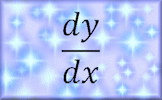Here are some specific activities, investigations or visual aids we have picked out. Click anywhere in the grey area to access the resource.
 Differentiation Video A reminder of how to differentiate different types of functions and how to find the equations of tangents and normals.
Differentiation Video A reminder of how to differentiate different types of functions and how to find the equations of tangents and normals. Differentiation Practise the technique of differentiating polynomials with this self marking exercise.
Differentiation Practise the technique of differentiating polynomials with this self marking exercise.
Here are some exam-style questions on this statement:
- "A function is given as \(f(x)=3x^2-6x+4+\frac3x,-2\le x \le 4, x\ne 0\)." ... more
- "Consider the function \(f(x)=6 - ax+\frac 3{x^2},x\neq 0\)" ... more
- "Consider the cubic function \(f(x)=\frac{1}{6}x^3-2x^2+6x-2\)" ... more
- "Consider the function \(f(x)=x^3-9x+2\)." ... more
- "Let \(f(x)=jx^3+jx^2+kx+m\) where \(j, k\) and \(m\) are constants." ... more
- "Consider the function \(f(x)=\frac{20}{x^2}+kx\) where \(k\) is a constant and \(x\neq0\)." ... more
Click on a topic below for suggested lesson Starters, resources and activities from Transum.
Furthermore
The derivative of a function represents the rate of change of the function with respect to its independent variable. For functions of the form \( f(x) = ax^n + bx^{n-1} + \ldots \), where all exponents are integers and \( a, b, \ldots \) are constants, the derivative can be found using the power rule. The power rule states that the derivative of \( x^n \) is \( nx^{n-1} \). By applying this rule term-by-term, we can find the derivative of the entire function.
For example, consider the function: $$ f(x) = 3x^4 + 2x^3 - x^2 + 5x + 7 $$ The derivative of this function is: $$ f'(x) = 12x^3 + 6x^2 - 2x + 5 $$
This video on the Basics of Differentiation is from Revision Village and is aimed at students taking the IB Maths Standard level course
If you use a TI-Nspire GDC there are instructions useful for this topic.
How do you teach this topic? Do you have any tips or suggestions for other teachers? It is always useful to receive feedback and helps make these free resources even more useful for Maths teachers anywhere in the world. Click here to enter your comments.

